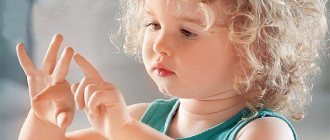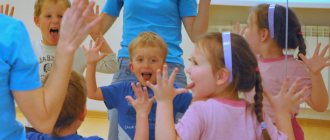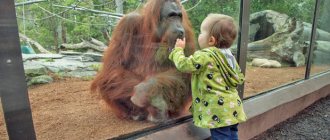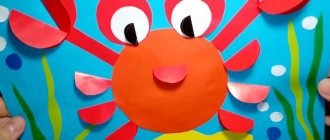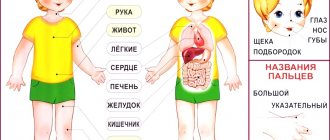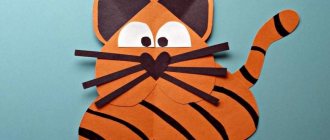Finger games develop the child’s brain, stimulate speech development, creativity, and imagination. Simple movements help to remove tension not only from the hands themselves, but also to relax the muscles of the whole body. They can improve the pronunciation of many sounds. In general, the better the fingers and the entire hand work, the better the child speaks.
We offer the best finger games for children of different ages - toddlers and children over 5 years old.
«The hand is the tool of all tools
". - said Aristotle.
How to play finger games
Recommendations for conducting finger games:
- Before the game, we discuss its content with the children, immediately practicing the necessary gestures, finger combinations, and movements. This not only allows children to be prepared to perform exercises correctly, but also creates the necessary emotional mood.
- Before starting the exercises, children warm up their palms with light strokes until they feel pleasantly warm.
- All exercises are performed at a slow pace, from 3 to 5 times, first with the right hand, then with the left, and then with both hands together.
- When performing exercises with children, you must demonstrate your own passion for the game.
- When performing exercises, it is necessary to involve, if possible, all fingers of the hand.
- It is necessary to ensure the correct placement of the hand and precise switching from one movement to another.
- It is necessary to ensure that all exercises are performed by children easily, without excessive strain on the arm muscles, so that they bring joy.
- All instructions are given in a calm, friendly tone, clearly, without unnecessary words. If necessary, children are provided with assistance.
- Ideally: each lesson has its own name, lasts a few minutes and is repeated 2-3 times during the day.
- When playing the game repeatedly, children often begin to pronounce the text partially (especially the beginning and ending of phrases). Gradually, the text is learned by heart, children pronounce it in its entirety, correlating the words with the movement.
- Having chosen two or three exercises, we gradually replace them with new ones. We keep the games we like most in our repertoire and return to them at the request of the children.
- We very clearly adhere to the following rule: do not set children several complex tasks at once (for example: showing movements and pronouncing text). Since children have a limited attention span, an impossible task can “discourage” interest in the game.
- Never force! Try to understand the reasons for the refusal, if possible, eliminate them (for example, by changing the task) or change the game.
Children's finger games
Finger games are exercises designed to train the fingers. Warming up and training your arms is useful not only in childhood. For example, in some professions, activating fine finger movements is extremely important. And in preschool age, when the body is in an active stage of development, every child will benefit from exercises that help develop flexibility and mobility of the fingers.
Finger games have long been proven as a method for developing fine motor skills. They have an obvious advantage over other means.
The development of motor skills is facilitated by manipulation of small details - laying out mosaic pictures, designing, stringing beads on a thread or skewer, cutting out paper and cardboard, lacing, etc.
But mainly three fingers are involved in such actions, and the ring and little fingers are passive. Special hand games are great because they use all the fingers.
There are types of finger games suitable for preschool age:
- Movement and touch with fingers that imitate natural movements taken from the surrounding nature.
- Performing certain movements on command in a given rhythm.
- Games using improvised objects (string, pencil, pebbles).
A variety of exercises contributes to the harmonious development of the hands. It is the integrated approach that provides a complete combination of motor skills: compression, stretching, muscle relaxation.
Many finger games are accompanied by poetry or a fairy-tale metaphor, which increases children's interest in such activities. Rhythmic songs are easy to remember and encourage children to play games.
The influence of finger games on children's development
Games in which hands are the main tools and characters gradually transform fingers from clumsy to obedient. Due to this, fine motor movements become more and more skillful.
Finger games have a direct impact on the development of the hands, and also indirectly activate the work of the brain in children and affect the formation of speech functions.
The main goals of finger games for preschoolers:
- Prepare your hand for writing
- To prevent the possible manifestation of writer's cramp during increased writing load when entering school
- Stimulate speech development
- Develop voluntary movements
You should not be lenient about finger games, considering them too simple to have a significant impact on the development of the child. These are really simple but effective exercises. Especially if all fingers are used in the game, and the movements are performed energetically.
The importance of finger games for the development of speech in preschoolers
Physiological scientists have long proven the influence of hand motor skills on speech development. First, the movements of the child’s fingers develop, and after this, the articulation of syllables appears. In the psychological literature, there are tables of correspondence between the level of fine movements of children's fingers and the degree of speech development.
If the development of finger movements corresponds to the age norm, then the child’s speech has already reached standard levels. Another dependence is also observed - if the motor skills of the baby’s hands are insufficiently flexible and variable, his speech development is delayed.
Therefore, attention should be paid to the development of children's fingers from the first year of life. It’s not for nothing that our wise ancestors came up with nursery rhymes and used children’s hands in such simple games as “Magpie-Crow”.
Active finger training is never too early. The sooner you start paying attention to developing your hand, the more benefits such activities will bring to your baby. The techniques can be different, the main thing is that all fingers are involved in the action.
A large selection of finger games and exercises was compiled by psychophysiologist M.S. Ruzina. This author’s workshop contains games that are applicable at all stages of preschool age. We will provide some exercises in this article.
Finger gymnastics for children 5-6 years old in kindergarten card index with goals according to the Federal State Educational Standard
My little finger, where have you been? With Nameless I cooked cabbage soup, And with Middle I ate porridge, With Index I sang. And Big met me and treated me to candy. The index finger on the right led the whole horde of us on the march. The middle brother carries a backpack, the Nameless one walks like this, and the Little Finger began to play: invite the brothers to listen. The one on the right was dancing. And he invited me to dance. One two three four five! (M. Kaltsova) This finger wants to sleep, This finger jumps into bed, This finger takes a nap, This finger is already asleep. Fingers stood up - “Hurray!” It's time to go to kindergarten! (M. Kaltsova) Ivan the Bolshak - to chop wood, Vaska the Pointer - to carry water, Mishka the Middle - to light the stove, Grishka the Orphan - to cook porridge, and Little Timoshka - to sing songs. Sing songs and dance, amuse siblings! (Russian folk) A squirrel sits on a cart, She sells nuts: To the little fox-sister, To the sparrow, to the titmouse, To the fat-fifted bear And to the mustachioed bunny. One two three four five! Let your fingers go for a walk! One two three four five! They hid in the house again. One two three four five! Let your fingers go for a walk! This finger found a mushroom, This finger cleaned the table, This finger cut, This finger ate. Well, this one just looked! (Russian folk) ——————- Masha began to gather guests (clap your hands) And Ivan come (with the tip of the half-bent index finger of your right hand, run over all the fingers of your left hand in turn; start with the thumb), And Stepan come, Yes And Andrey come, And Matvey come, And Mitroshechka Well, please! (with the index finger of your right hand, shake the little finger of your left hand four times) Masha began to treat the guests (clap your hands) And for Ivan (turn your left hand palm up with the thumb of your right hand, press the pads of each finger in turn) And for Stepan, and for Andrey , And damn it for Matvey, and Mint gingerbread for Mitroshechka! (the thumb of the right hand presses the little finger of the left hand four times) Masha began to see off the guests (clap your hands) Farewell, Ivan! (bend your fingers on your left hand one by one) Goodbye, Stepan! Goodbye, Andrey! Goodbye, Matvey! On the mountain we see a house (make a house out of your palms: all fingers touch at the tips - “roof of the house”) A lot of greenery all around (make wave-like movements with your hands) Here are trees, here are bushes (depict trees and bushes) Here are fragrant flowers (make a “bud” from your palms ") There is a fence surrounding everything (draw a fence. You can draw a zigzag line in the air with your finger) Behind the fence is a clean yard (stroke the table or the air with your palms) We open the gate (draw a gate opening) We quickly run up to the house (fingers “run” along the table) B We knock on the door: (fists on the table) knock-knock-knock. Is someone coming to our door? (put your palm to your ear, as if you are listening) We came to visit a friend And brought gifts (extend your arms forward, as if carrying something) Together, your fingers stood in a row (show your palms) Ten strong guys (clench your fingers into a fist) These two - a pointer to everything (show your index fingers) Everyone will be shown without prompting. Fingers – two middle fingers (show your middle fingers) Two healthy, vigorous ones. Well, these ring ones (show ring fingers) are silent, always stubborn. Two short little fingers (pull out your little fingers) Fidgets and rogues. The fingers are the main ones among them (show your thumbs) Two large and remote (clench the remaining fingers into a fist) —————— read the poem out loud, showing and slightly shaking each finger One, two, three, four, five, we will count the fingers , Five on the right, five on the left, Tanya and Seva know this. Together there will be ten of them, friendly, strong guys. Everyone has plenty to do! We will give them names. Here is the big one, or Bolshak. He is an expert at helping everyone! Lives separately from others. It can work for three! There is a Pointer behind him. His strong point is hinting. Without delay, He will show us the way to the jam. Here is the Middle Peak, or average, He is the third, not the last. Calm, very strong, like an epic hero. The fourth is an Orphan, a child without a name, with a tin thimble, called nameless. And the fifth is Shorty, Mischievous boy, Naughty and fussy, Little Finger! We chop and chop the cabbage, We salt and salt the cabbage, We three and three cabbage, We press and press the cabbage. We mark three-three, we cucumber mode-mode The whole salad is mixed and mixed. It turned out to be a deluxe salad. There are five fingers on my hand, Five graspers, five holders. To plan and to saw, To take and to give. It's not hard to count them: One, two, three, four, five! The fingers went for a walk, and the second ones went to catch up. The third fingers are running, and the fourth fingers are walking. The fifth finger jumped and fell at the end of the path. We met two kittens: “Meow-meow!”, Two puppies: “Aw-aw!”, Two foals: “Igo-go!”, Two tiger cubs: “R-rr!”, Two bulls: “Moo!” . Look at the horns. To visit the big finger They came straight to the house The index and middle fingers, The nameless and last fingers The little little finger itself Knocked on the threshold. Together the fingers are friends, They can’t live without each other. One, two, three, four, five, Let's count our fingers! Strong, friendly, everyone is so necessary. On the other hand again: One, two, three, four, five! Fingers are fast, Although not very... clean. My fingers will tell, They can do everything, they will show everything. Five of them on my hand. They can do everything, they will always help. They play the pipe, they throw the ball, they wash the clothes, they sweep the floor, they count, they pinch, they caress, my fingers are on my hand. (for the first two lines - raise your hands up and turn your palms in and out. Then clap your hands. Then imitate the movements corresponding to the content of the poem) Don’t cry, my doll, You are left alone. I can’t play with you, I need to wash: Your dresses and socks, your skirts and stockings, Sweater, mittens, jacket, Hat, colored beret. I'll pour a little water and pour some powder into a basin. I’ll whip up the snow foam, wash it and go. While the sun is shining, I'll pull the string. I’ll attach the clothes to it and dry everything with the breeze. I quickly iron the linen back and forth with the iron. We've worked together, and now we'll rest. (for the first four lines, imitate the motion sickness of a doll. then bend your fingers one by one. then imitate the movements described in the poem. for the last lines, place your palms on the table or on your knees) ——————— Who lives in the village? Lazyboka is a red cat. Little calf, Yellow chicken, White sheep, Mouse under the porch! One, two, three, four, five, It’s not hard to count them! Who lives in the forest? Under a snag there is an old mole, Behind the mountain there is a little fox, In a spruce forest there is a calf. There is a fox under the bush, and a titmouse on the pine tree! One, two, three, four, five, Let's bend our fingers. We have a toy: This is a rattle, This is a fat bear, This is a miracle book, This is a tumbler, This is a Masha doll! One, two, three, four, five, Let's check again! Warm-up for fingers (we learn how to make a lock correctly - we “fasten” our fingers together): There is a lock hanging on the door (the baby makes the lock) Who could open it? Turned, turned (the little one turns the lock in one direction first - we develop the hands) Twisted, twisted (the little one turns the lock in the other direction) Knocked, knocked (the little one knocks on his knee with the lock) Pulled, pulled (the little one pulls his hands in different directions) And opened the lock !!!(takes hands apart, as if the lock has finally been opened!!!)
